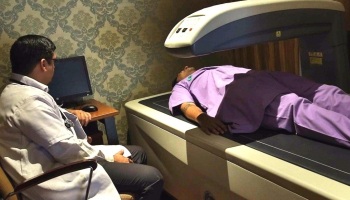Bengaluru company brings affordable blood test for cancer to market

A little Indian organization propelled on Tuesday a blood test to recognize an extensive variety of tumors at a small amount of the cost of comparative diagnostics accessible in the United States.
Bengaluru-based Strand Life Sciences' test is intended to interpret hereditary data, which thusly will help specialists to match patients with medications well on the way to help with their specific kind of tumor — an approach that is progressively turning into the medicinal standard.
Strand's tests will be sold for 20,000 rupees ($310), while comparative innovation in the United States costs more than $3,000.
Ordinary and destructive cells shed DNA into the blood when they bite the dust. Strand's tests catch these DNA parts to decide the nearness of strong tumor growths.
There are many favorable circumstances to this approach. Strong tumor diseases are ordinarily analyzed utilizing intrusive tissue biopsies or radioactive sweeps, which can be costly, unsafe and insufficient.
Strand's tests can discover proof of tumors in spots difficult to reach to specialists, distinguish early indications of malignancy repeat and help specialists endorse the fitting treatment.
A 125-tolerant review demonstrated that Strand's innovation could distinguish tumor follows in up to 35 for every penny of cases with early-arrange growth and 70-90 for every penny of cases with cutting edge malignancy.
No less than 1.5 million Indians are determined to have tumor every year and exactly 200,000 will be qualified and additionally can bear the cost of this item, Strand CEO Ramesh Hariharan stated, including that he expects around 1,000 of its tests would be led every month by one year from now.
Specialists are concentrating on building up a blood test used to recognize early-organize tumors in individuals without any manifestations of the illness, something that has pulled in a huge number of dollars in a venture.
Cowen and Co evaluate that utilization of DNA blood tests for disease screening will surpass $10 billion a year before the decade's over.
A few organizations around the globe are creating or offering fluid biopsies. Be that as it may, existing innovation in India is not all around approved, and is primarily utilized as a part of patients as of now determined to have a particular sort of disease or just to identify a couple sorts of the tumor.
Strand, established by two teachers at the Indian Institute of Science, teamed up with the Mazumdar Shaw Center for Translational Research, which is controlled by Biocon Ltd originator Kiran Mazumdar-Shaw, to build up the blood tests.
Comments
Post a Comment